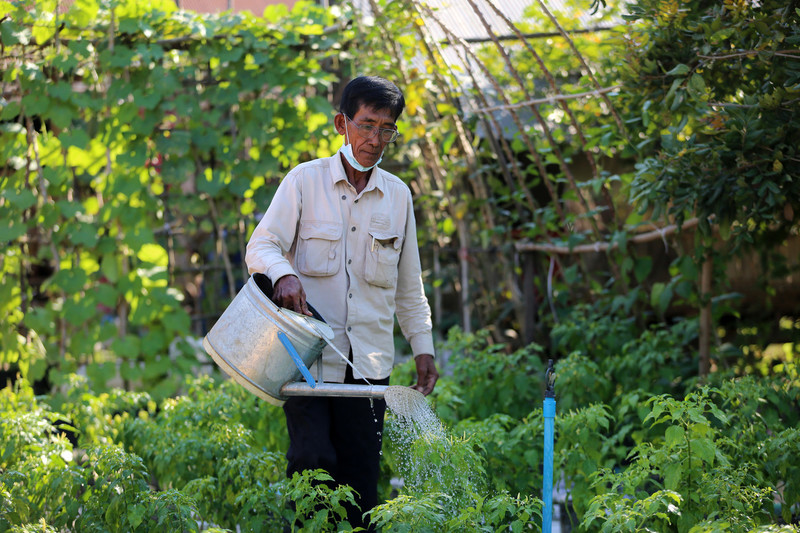Climate-smart Agriculture in the context of the Water-Food-Energy Nexus
Event

Soeung Bunthoeun, 66, is one of the Agricultural Cooperative Sangha Phal community members in Prey Sangha Village, Kgnach Romeas commune, Bavel district in Battambang province. Photo by Chor Sokunthea/ ADB.
The workshop “Climate-smart Agriculture in the context of the Water-Food-Energy Nexus” will be held on 24 March 2022, supported by the Greater Mekong Subregion (GMS) Sustainable Agriculture and Food Security Program (TA 9916). TA 9916 aims to contribute to the Asian Development Bank’s (ADB) assistance on the Water-Food-Energy Nexus and assist in promoting cooperation across the GMS in efforts to reduce Nexus trade-offs. This upcoming interactive Water-Food-Energy Nexus Workshop will introduce stakeholders in the GMS to the Nexus approach and engage them in policy dialogue to jointly explore typical Nexus trade-offs.
The GMS Working Group on Agriculture (WGA), at its 16th Annual Meeting held in Luang Prabang, Lao PDR in June 2019, identified “Adapting agriculture to climate change in the context of the Water-Energy-Food Security Nexus” as one of six themes for ADB support. During the inception of TA 9916 from December to May 2021, a comprehensive survey of the awareness of the Nexus in each of the six GMS countries was undertaken. The initial findings from the survey revealed that while 93% of respondents were interested or very interested in applying the Nexus approach in their work, only 64% has heard about the Nexus. This emphasized the need to improve stakeholders’ awareness and understanding of the Nexus and how it can be applied in their sector specific context to improve development outcomes.
Objectives of the Workshop
- National agriculture sector policy makers to be more aware of Nexus thinking and Nexus trade-offs;
- Increase Donor Partner awareness of need to mitigate Nexus trade-offs and consider the Water-Food-Energy Nexus in sector planning;
- Facilitate dialogue between MAFF officials and Donor Partners to support Nexus planning; and
- Identify the role that TA 9916 and its consultants can play to assist GMS stakeholders with successfully applying the Nexus approach in their work.
Expected Outputs
- The national agriculture sector policy makers are more aware of the Nexus approach;
- Donor Partners have increased awareness of the needs for supporting GMS stakeholders to apply Nexus approach and thereby mitigate Nexus trade-offs; and
- TA 9916 project and consultants’ proactive engagement to assist GMS stakeholders with their efforts to apply the Nexus approach;
- Nexus policy issues for further dialogue identified.
GMS Sustainable Agriculture and Food Security Program
TA 9916, GMS Sustainable Agriculture and Food Security Program, contributes to ADB’s assistance to COVID-19 agricultural sector response and GMS-wide cooperation on COVID-19 response and recovery efforts. The expected impact of the technical assistance is realizing the GMS vision of being a leading supplier of safe and climate-friendly agri-food products. The outcome of the TA is increased GMS investments and capacity for climate-friendly, safe, and sustainable agri-food value chains. The TA has three outputs: (i) COVID-19, climate-friendly, inclusive, and gender-responsive agri-food value chains and agribusinesses strengthened; (ii) Harmonized crop and livestock safety and quality systems adopted; and (iii) Climate-adaptive agriculture in the context of the water-energy-food security nexus enhanced. ADB is the executing agency for the TA. The GMS Working Group on Agriculture (WGA), in collaboration with relevant departments of the Ministry of Agriculture and other ministries (e.g., commerce, environment, finance, industry, science and technology, trade), will oversee the implementation of the TA.
Last Updated: 17 March 2022
